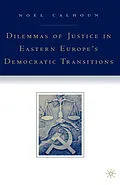Calhoun innovatively examines how the ideology of liberal democracy influences one of the most contentious and potentially traumatic and divisive issues facing countries transitioning from authoritarian regimes to democracy: how to confront the past violations of human rights. Competing views of liberal democracy frame debates about how to confront the past and in particular how to deal with the truth of systematic human rights violations. Democratic values may not determine the precise method of dealing with the past - whether through truth commissions, lustration, or tribunals - but the very process of debate inherent in democratic theory and practice has important implications for the perceived fairness of the result. These implications are examined through a comparison of transitional justice in East Germany, Poland and Russia. The result is a provocative integration of democratic theory and comparative politics.
Autorentext
NOEL ANN CALHOUN currently works for the United Nations High Commissioner for Refugees in Moscow, Russia. She previously taught comparative politics at the City University of New York and Moscow State University. She holds a Ph.D. in political science from Harvard University, USA.
Inhalt
Introduction to the Dilemma of Transitional Justice The Politics of Transitional Justice Liberal Democratic Ideology and Transitional Justice Germany Comes to Terms with the Past, Again Poland's Long Search for Justice Russia's Buried Past Liberal Democracy's Shortcomings and Overriding Advantage Appendices Bibliography
